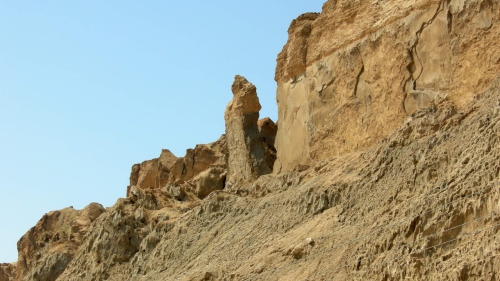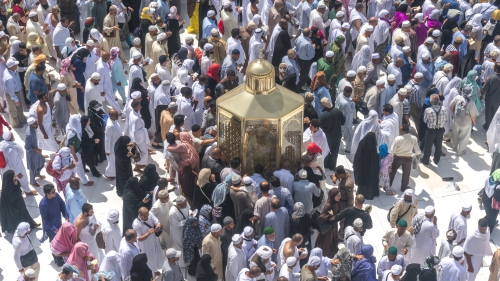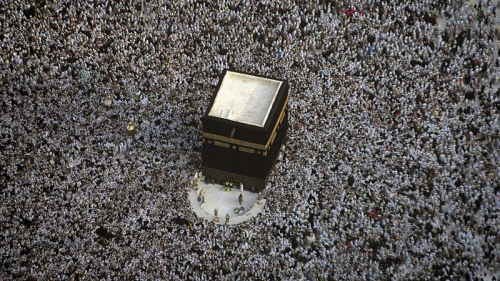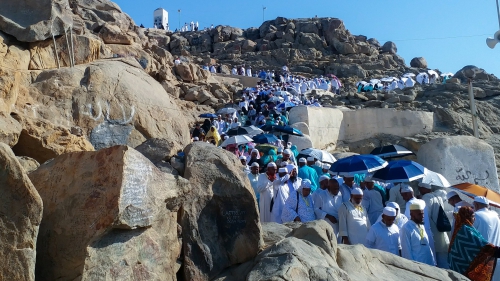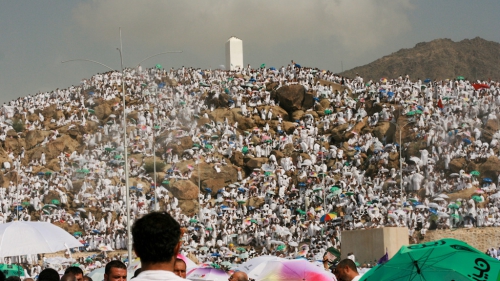Abraham And His Sons: Udhiya, Qurbani and Korban

After the symbolic “stoning of the devil.” comes the beginning of Eid Al-Adha, the festival of sacrifice, which will be marked on Sunday.
Prophet Muhammad was once asked by his Companions: "O Prophet of Allah! What is this qurbani?" He replied, "It is the Sunnah of your father Ibrahim ." (Hadith - Ibn Majah)
Udhiyah or animal sacrifice is an act of worship which reminds Islamic and Jewish monotheists of the great act of sacrifice that Prophet Ibrahim and his sons, Prophet Ismail, and Prophet Ishaq were willing to do for the sake of Allah. This sacrifice is ordained upon Muslims to be given each year at the time of Eid al-Adha.
Every Muslim adult; male and female – as long as they can afford it – are required (Wajib) to offer this sacrifice in order to express their gratitude to God: “Thus have We made animals subject to you, that ye may be grateful. It is not their meat nor their blood, that reaches Allah. it is your piety that reaches Him: He has thus made them subject to you, that you may glorify Allah for His Guidance to you and proclaim the good news to all who do right,” (Qur’an 22:36-37)
And Jews remember Prophet Abraham’s and Prophet Ishaq’s willingness to meet Allah’s test each year, when they celebrate the beginning of the new religious year (Rosh HaShanah) by reading chapter 22 of the Book of Genesis in the Torah, during the three-hour long morning service.
Although the word Qurbani/Korban is usually translated as sacrifice, it is better to think of it as an offering of our ‘self’ i.e. a self-offering. As Allah says in the Qur'an: "It is neither their flesh nor their blood that reaches Allah; it is your piety that reaches Him." (22:37)
Abraham was willing to offer his own life in Nimrod's fire (Qur'an 21:68-71 and oral traditions in Jewish, Christian and Muslim sources); and after waiting many years until he finally had two sons; Abraham risked a terrible loss, not once but twice, of each of his sons, because he had full trust in God.
This is the same basic understanding that the Hebrew Prophets and the Rabbis gave to the offerings in the Temple of Solomon. Neither the meat nor the blood of the Korbanot (plural korban) reaches God. It is your good deeds and your study of Torah that reaches God.
Qurbani is not just a sacrifice offered at the time of Eid al-Adha to show gratitude towards Allah. It also provides for us to directly provide food for the poor and needy. "And [mention] when We made the (Ka’ba) House a place of return for the people and (a place of) security. And take the standing place of Abraham as a place of prayer. We charged Abraham and Ishmael: "Purify My House for those who perform Tawaf (circling) and those who are staying for worship, and those who bow and prostrate (in prayer)." (Quran 2:125)
The following ancient narrative, transmitted orally in both Arabic and Hebrew throughout many centuries, and finally written down in several versions in the mid-19th century is a good example of the meaning of Ibrahim’s Qurbani/Korban.
Two brothers who had inherited land from their father, divided the land in half so each one could farm his own section. One brother’s land was mostly on an upper hillside; the other brother’s land was mostly in a valley on the other side of the hill. Over time, the older brother married and had four children, while the younger brother was still not married.
One year there was very little rain, and the crop was very meager. This was at the beginning of a long-term drought that would turn the whole valley into an arid, treeless, desert where grain did not grow and all the springs dried up.
The younger brother lay awake one night praying and thought. "My brother has a wife and four children to feed and I have no children. He needs more grain than I do; especially now when grain is scarce."
So that night the younger brother went to his silo, gathered a large bundle of wheat, and climbed the hill that separated the two farms and over to his brother's farm. He left his wheat in his brother's silo, and returned home, feeling pleased with himself.
Earlier that very same night, the older brother was also lying awake praying for rain when he thought. "In my old age my wife and I will have our grown children to take care of us, as well as grandchildren to enjoy, while my brother will probably have no children. He should at least sell more grain from the fields now, so he can provide for himself in his old age."
So that night, the older brother also gathered a large bundle of wheat, climbed the hill, left it in his brother's silo, and returned home, feeling pleased with himself.
The next morning, the younger brother was surprised to see the amount of grain in his barn seemed unchanged. "I must not have taken as much wheat as I thought," he said. "Tonight, I'll be sure to take more." That same morning, the older brother standing in his barn, was thinking the same thoughts.
After night fell, each brother gathered a greater amount of wheat from his barn and in the dark, secretly delivered it to his brother's barn. The next morning, the brothers were again puzzled and perplexed. "How can I be mistaken?" each one thought. "There's the same amount of grain here as there was before. This is impossible! Tonight I'll make no mistake - I'll take two large sacks.”
The third night, more determined than ever, each brother gathered two large sacks of wheat from his barn, loaded them onto a cart, and slowly pulled his cart through the fields and up the hill to his brother's barn.
At the top of the hill, with only a little light from a new moon, each brother noticed a figure in the distance. When the two brothers recognized the form of the other brother and the load he was pulling behind, they both realized what had happened. Without a word, they dropped the ropes of their carts, ran to each other and embraced.
Christians and Jews believe the hill is Jerusalem. Muslims believe the valley is Mecca.
I believe they are both right and God willing, someday everyone will see both cities and their sanctuaries as a pair of lungs; that are central to humanity’s spiritual inspiration by, and connection to, the One God of Abraham, Ishmael, and Isaac.
As the Qur’an states: "Believers, be steadfast in the cause of God and bear witness with justice. Do not let your enmity for others turn you away from justice. Deal justly; that is nearest to being God-fearing." (5:8)
May the inspiration of this ancient tale, transmitted orally for so many centuries in both Arabic and Hebrew, help Christians, Jews, and Muslims overcome the many dark, hate filled actions occurring in today’s world.
As the Qur’an states: Good and evil deeds are not equal. Repel evil with what is better; then you will see that one who was once your enemy has become your dearest friend…” (41:34)
And as the Bible states: “In that day there will be a highway from Egypt to Assyria. The Assyrians will go to Egypt, and the Egyptians to Assyria. The Egyptians and Assyrians will worship together. In that day Israel will join a three-party alliance with Egypt and Assyria— a blessing upon the earth. The LORD of Hosts will bless them, saying, “Blessed be Egypt My people, Assyria My handiwork, and Israel My inheritance.” (Isaiah 19:23-5)
Allen S. Maller is an ordained Reform Rabbi who retired in 2006 after 39 years as the Rabbi of Temple Akiba in Culver City, California. His web site is: www.rabbimaller.com. He blogs on the Times of Israel. Rabbi Maller has published 400+ articles in some two dozen different Christian, Jewish, and Muslim magazines and web sites. He is the author of: "Judaism and Islam as Synergistic Monotheisms'
Topics: Interfaith, Prophet Ibrahim (Abraham), Qurbani (Udhiyyah), Torah
Views: 1951
Related Suggestions








